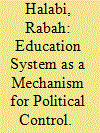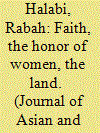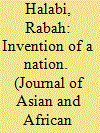|
|
|
Sort Order |
|
|
|
Items / Page
|
|
|
|
|
|
|
| Srl | Item |
| 1 |
ID:
162419


|
|
|
|
|
| Summary/Abstract |
In 1976, the educational system serving Druze villages in Israel was separated from the overall Arab school system and a distinct educational system was set up for the Druze. This was done because the Druze serve in the army. The State believed it was necessary to prepare them for service and reduce inevitable dilemmas concerning their identification with the State, in general, and dilemmas concerning the service, in particular. This educational system was staffed mainly by Druze and featured an intensive, purposeful effort, both in terms of the formal curriculum and informal education, to create an Israeli-Druze consciousness among the students. This consciousness was meant to cause Druze youth to identify with the State and its symbols, and involved an emphasis on what the Druze and the Jews have in common along with what separates the Druze and other Arabs.
|
|
|
|
|
|
|
|
|
|
|
|
|
|
|
|
| 2 |
ID:
140117


|
|
|
|
|
| Summary/Abstract |
This study investigates the status of the Druze women in Israel, focusing on the effects of the frequent interactions between the Druze and the more permissive Jewish-Western society. The main question posed is why Druze women accept the double standards of freedom, especially on sexual morality, that expect them to be chaste but allow sexual freedom to men. I argue that this is a patriarchal deal, in which women trade their sexual freedom in exchange for access to higher education, and to the prestigious status of moral guardians from western temptations. The paper is based on narrative analysis of in-depth interviews conducted with 50 Druze students, half of them male and half female, enrolled in Israeli universities.
|
|
|
|
|
|
|
|
|
|
|
|
|
|
|
|
| 3 |
ID:
132309


|
|
|
|
|
| Publication |
2014.
|
| Summary/Abstract |
Ethnic and national identities are shaped and evolve in the context of complex negotiations sustained among multiple players, each with its own and often contradicting interests. This study focuses on one unique cultural group, the Druze in Israel, and examines a multifaceted identity constructed as a direct result of policies and expectations of members and institutions of majority groups. My aim is to explore how this identity is defined within the complex intergroup context, the various components and their inter-relations (congruent or conflictual), and the way its boundaries are shaped through interaction with other identities in Israel. The analysis of the interviews conducted with 50 Druze university students in Israel yielded three major content categories: 'Druze by blood;' 'Arab, but less so;' and 'Being Israeli.' The Druze identity is constructed in primordialist terms, and a central role is assigned to the belief in reincarnation. The Arab identity is categorized primarily as a national one, and it is strongly affected by the negative attitude of Arabs toward the service of the Druze in the Israeli army. Three major aspects emerged in relation to the Israeli identity of the Druze: the fact of their being citizens of the State of Israel, the attitude of the state and of Jews toward them, and the army service. Our study portrays a highly complex and problematic constellation of group identities, shaped as a delicate adaptation to the unique position of a group subject to multiple political forces in the past and present.
|
|
|
|
|
|
|
|
|
|
|
|
|
|
|
|
|
|
|
|
|